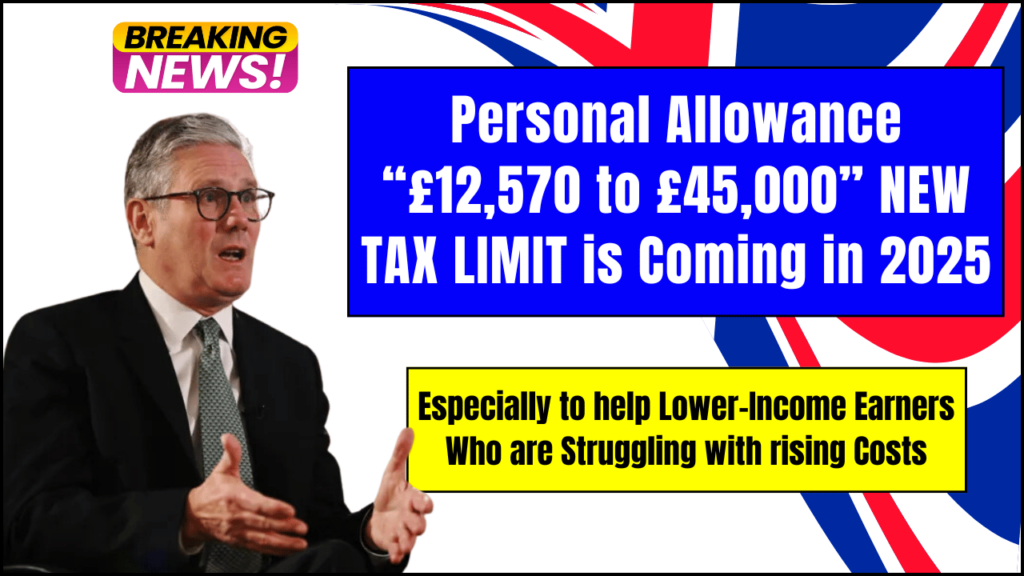
In 2025, the Personal Allowance in the UK still stands at £12,570, which means anyone earning up to that amount does not pay income tax. However, with living costs continuing to rise, many people and campaigners are calling for a big change — increasing the tax-free Personal Allowance to £45,000.
This bold idea could make a real difference for millions of workers, especially those on low to middle incomes who are finding it harder and harder to cope with everyday expenses.
What Is the Personal Allowance?
The Personal Allowance is the amount of money you are allowed to earn each year without paying income tax. As of 2025, this allowance is set at £12,570.
For example:
- If you earn £12,000 in a year, you pay no income tax.
- If you earn £20,000, you pay tax only on £7,430 (which is the amount above £12,570).
The current basic rate of income tax is 20%, so this can take a significant chunk out of people’s wages. That’s why many are now pushing for the allowance to rise significantly.
Why Do People Want It Raised to £45,000?
The main reason is simple: costs are going up, but wages and allowances are not.
Here are some key arguments from supporters of the change:
- Living costs have increased – groceries, rent, energy bills, and transportation are all more expensive than they were a few years ago.
- The allowance hasn’t kept up – while prices have gone up, the Personal Allowance has barely changed in recent years.
- Low earners are struggling – many people working full-time jobs still find it hard to cover basic needs.
- Raising the limit would help them keep more of their money rather than handing it over in taxes.
DWP £2,950 Pension for Women born in the 1950s, The Battle for Pension Compensation
UK £200 Cost of Living Payment, Application Process and Deadlines
How Would This Change Help Everyday People?
If the Personal Allowance was raised to £45,000, it would mean that:
- People who earn up to £45,000 would not pay any income tax at all.
- This could give workers thousands of pounds extra in their pockets each year.
- The extra money could go towards paying rent, buying food, or saving for the future.
Will This Only Help Low-Income Earners?
While the focus is on helping low and middle-income earners, this change would technically help everyone earning under £45,000. However, the real benefit is for those who are currently struggling the most.
Wealthier individuals already have many ways to reduce their tax bills through investments or financial planning. But regular workers — like shop assistants, delivery drivers, carers, and teachers — often have no choice but to pay full tax on every extra pound they earn.
That’s why many believe that raising the allowance would make the system fairer and more balanced.
What Are the Critics Saying?
Of course, not everyone agrees with the plan. Some critics say:
- The government would lose a lot of money – income tax is one of the biggest sources of government funding.
- If fewer people pay taxes, the government might have to cut services or raise taxes in other areas to make up for the loss.
- There are concerns that higher earners would also benefit, even though they don’t need the extra help.
However, supporters respond that:
- Helping millions of working people is worth the cost.
- The extra money people save will likely be spent in the economy, helping businesses and creating jobs.
- It could also reduce pressure on public services, as people would rely less on benefits and support.
Could This Help Reduce Inequality?
Yes — and that’s one of the biggest goals behind this idea.
Right now, many people on low wages pay a larger percentage of their income in taxes than some wealthy individuals who use tax loopholes or offshore accounts.
By raising the Personal Allowance, we would be:
- Giving lower earners a better chance to save and invest.
- Helping families to afford basic needs without debt.
- Closing the gap between the rich and the poor, at least a little.
Many believe it’s a step toward a fairer tax system — one that doesn’t punish people just for working hard but earning less.
Is This Change Likely to Happen?
As of now, this is still a proposal, not a confirmed policy.
But the idea is gaining more attention, especially as economic pressures continue to build. Campaigners, unions, and even some politicians are starting to speak out in favour of raising the allowance to help ordinary people survive in today’s difficult economy.
Whether the government will actually go through with it remains to be seen. But one thing is clear: the demand for change is growing louder.
Final Thoughts
Raising the Personal Allowance from £12,570 to £45,000 could change millions of lives for the better. It would allow workers to keep more of what they earn and help families deal with rising costs without relying on debt or government support.
While the proposal is still under discussion, it reflects a bigger conversation happening in the UK: How do we create a fairer economy where everyone gets a fair shot?
The coming months will reveal whether those in power are ready to act — or whether this call for fairness will continue to fall on deaf ears.